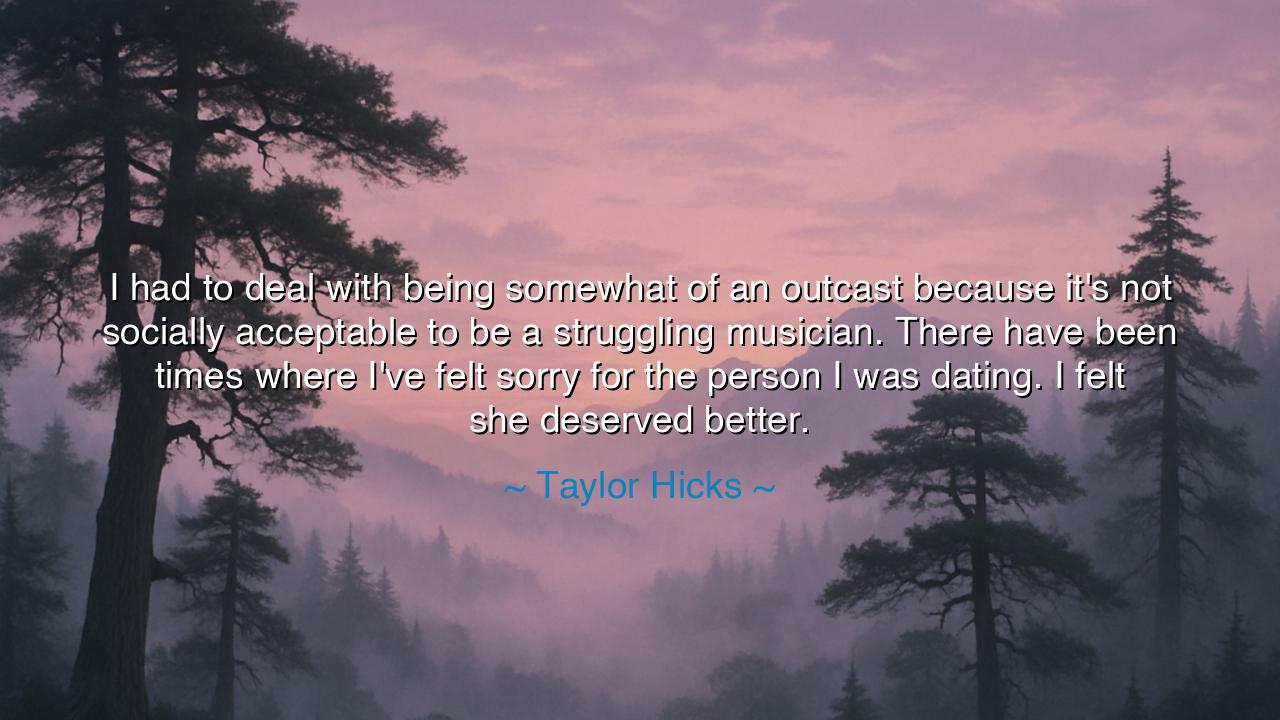
I had to deal with being somewhat of an outcast because it's not
I had to deal with being somewhat of an outcast because it's not socially acceptable to be a struggling musician. There have been times where I've felt sorry for the person I was dating. I felt she deserved better.






In the words of Taylor Hicks, the musician who sang from the heart long before fame ever found him, we hear the aching honesty of a man who knew both struggle and solitude: “I had to deal with being somewhat of an outcast because it’s not socially acceptable to be a struggling musician. There have been times where I’ve felt sorry for the person I was dating. I felt she deserved better.” His confession is not merely about hardship, but about the burden of purpose — the tension between the dream that calls and the world that demands conformity. It is the voice of one who stands between the fire of art and the coldness of society’s judgment.
The meaning of these words lies deep in the human story of creation and sacrifice. For every artist, there comes a time when their devotion isolates them — when others cannot understand why they endure poverty, rejection, or ridicule in pursuit of a vision that no one else can yet see. Hicks speaks of this exile with humility, not bitterness. “It’s not socially acceptable to be a struggling musician,” he says, naming a truth older than time: that society often celebrates art only after it has been proven successful, but seldom honors it while it is being born. The struggling artist, like the prophet or the poet of old, lives unseen — bearing both the gift and the cost of creation.
This struggle has echoes throughout history. Consider Vincent van Gogh, who painted the fields of Arles with colors that seemed to bleed from heaven itself, yet lived in poverty and despair. In his lifetime, he sold but one painting. The world called him mad; today, it calls him genius. Between those two judgments lay his suffering. So too with Hicks — though his path was in music, not paint, the struggle is the same: to remain faithful to one’s art when the world says it is folly. He felt the sting not only of rejection but of compassion — pity for those who loved him and had to share his uncertain road. His words, “I felt she deserved better,” are the lament of every dreamer who fears that his purpose might bring pain to those beside him.
Yet there is dignity in that pain. The ancients would have called it the price of calling — the burden of those chosen by the Muse. For Orpheus, the legendary musician of Greece, his art could charm even the stones, but it also doomed him to loss. He descended into the underworld for love, only to lose Eurydice once more. The artist’s gift, then as now, is double-edged: it creates beauty but demands solitude. Hicks’s outcast years were not shameful; they were sacred. In them, he learned the humility, resilience, and empathy that would later shape both his music and his soul.
But Hicks’s lament is not one of despair. There is in his words the quiet recognition that struggle refines the spirit. To feel sorry for one’s partner is to feel deeply — to care not only for oneself but for another. It shows compassion born from hardship. Many who have never walked that path may not understand this kind of love — a love that fears to hurt by simply existing. And yet, it is precisely such hearts, tempered by struggle, that produce the most enduring songs, the truest art, the deepest wisdom.
The lesson of Taylor Hicks’s reflection is clear: the world may not always honor the dreamer, but the dreamer must honor the world — not by giving up the dream, but by persevering with integrity. To those who walk a difficult road — the writer in the attic, the musician on the street corner, the painter who sells none of his works — let his words be a reminder that hardship is not failure. It is the forge in which purpose is made pure. Society may misunderstand, but time will reveal what struggle has created.
And so, remember this: if your calling sets you apart, do not curse it. The outcast today becomes the voice of tomorrow. Walk your path with humility, and love those who walk it with you. Be patient, for greatness often blooms in the soil of rejection. As Taylor Hicks teaches, to struggle is not shame — it is proof of devotion. And when at last your song is heard, let your gratitude be not for fame, but for the journey that made your soul strong enough to sing it.






AAdministratorAdministrator
Welcome, honored guests. Please leave a comment, we will respond soon